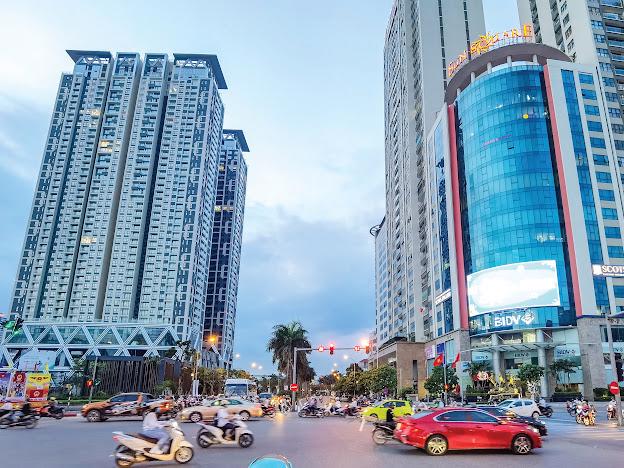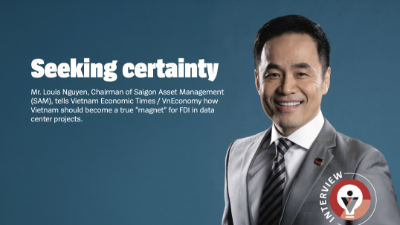The development of smart cities is viewed by the Vietnamese Government as a breakthrough measure in improving national competitiveness. The government supports the establishment of smart city projects combined with top-class technology to enhance both the country’s management and its economy, and this has attracted the attention of donors and their investment.
Matters of concern
A business delegation organized by the World Trade Centre Toronto, the Canadian Chamber of Commerce in Vietnam (CanCham), and their partners explored smart city development trends in Vietnam through an online workshop in late March. Both Vietnam and Canada are now accelerating investments in smart city technologies and projects, with building e-government to develop sustainable cities becoming the cornerstone of government planning and industrial activities.
Mr. Jack Nguyen, a member of CanCham, told VET that smart cities will allow the government to launch new services, models, communications, and policies using the latest digital technologies. “It makes sense that Vietnam is prioritizing its biggest and most important cities for smart city projects, such as Hanoi, Ho Chi Minh City, Da Nang, Binh Duong, and Nha Trang,” he added. “New technology application will help urban areas develop more sustainably through optimizing resources, protecting the environment, enhancing security, and meeting people’s demands. Consistent with Vietnam’s policies and efforts to develop smart cities, the primary goals are to create a sustainable urban environment, generate high quality of life for residents, and improve Vietnam’s economic competitiveness in the region and the world.”
RMIT University, meanwhile, worked with the Ho Chi Minh City People’s Committee early this year to shape smart cities development in the southern hub. The city is currently in the second phase of its smart city plan, which is running from 2021 to 2025, and has approved five sub-projects with a total investment of more than VND2.67 trillion ($116 million).
Associate Professor Nguyen Quang Trung from the School of Business & Management at RMIT said rapidly growing cities around the world are facing complex urban challenges, including ensuring economic growth, providing affordable housing, delivering water and sanitation, expanding clean energy, designing efficient transportation, and building an attractive environment to attract talent and investors while reducing carbon emissions and adapting to climate change. “RMIT is therefore leveraging its strengths in technology and management and would like to facilitate an exchange on ‘Managing Smart Cities for a Sustainable Future’ for Ho Chi Minh City,” he added. “There are also many positives regarding investments in smart city projects in Vietnam, such as the commitment of central government leaders, as reflected in several legal documents, a young and connected population, the potential of a new generation of digital enterprises, and the leading role of large domestic digital enterprises.”
The Japanese Government plans to set aside 250 billion yen ($2.4 billion) to support Japanese companies’ smart city projects in Southeast Asia. It will also encourage Japanese companies to participate in projects in 26 cities around ASEAN, including Hanoi and Ho Chi Minh City. According to Mr. Takeo Nakajima, Chief Representative of the Japan External Trade Organization in Hanoi (JETRO Hanoi), most smart city projects have several purposes, including reducing the carbon footprint, protecting the environment, enhancing smooth mobility, making government efficient, preventing disasters, reducing crime, and securing accessible healthcare. “In particular, Vietnam faces energy, environmental, and transportation challenges,” he said. “Initiatives in Vietnam would therefore provide many business opportunities for Japanese businesses.” Japan currently has more than 200 smart city projects around the country and supports the ASEAN smart city network. Japanese technology and solutions can help foster such initiatives. Becamex Tokyu, for example, has initiated new projects in Vietnam’s south.
Implementation issues
Building and developing smart city projects in Vietnam will also mean tackling a host of challenges. Finance is among the most pressing. Mr. Nguyen said that smart city investments require a lot of capital, especially for cloud technology, the Internet of Things (IoT), and other modern software, while also needing to create solutions with built-in protections against hacking and cyber-crime.
He also pointed out that smart cities require a wide range of infrastructure be put in place, including roads, logistics, and internet networks. While Vietnam has developed rapidly over the last decade, it still lags behind in infrastructure compared to its regional neighbors, so will have to invest further to realize its smart city dreams. He also touched on privacy concerns. In any major city, there is a balance to be found between quality of life and privacy. While everyone wants to enjoy a more convenient, peaceful, and healthy environment, nobody wants to feel like they are constantly being monitored by “Big Brother”. Educating and engaging the community, meanwhile, is also a key issue. “For a smart city to truly exist and thrive, it needs ‘smart’ citizens who are engaged and actively taking advantage of new technologies,” he explained. “With any new city-wide tech project, part of the implementation process must involve educating the community on its benefits.”
Regarding the investment plan of the Japanese Government, Mr. Takeo sees challenges in balancing stakeholders’ interests, as only benefiting narrow interests may cost the community in the long run. For example, providing an intelligent, comfortable transportation network is good for the environment, but this may come at a cost that is prohibitive.
Government bodies, meanwhile, have too many competing strategic goals, making them no longer strategic, while the existing rigid bureaucracy cannot keep pace with new and fast-changing technologies and will dissuade motivated and talented workers, according to Professor Trung. He also observed that domestic research and development (R&D) centers for smart cities are few and far between, and updated guidance frameworks and models are not yet in place. “Other challenges include resources, including budgets being limited and not sustainable for building a smart city, and a lack of discipline and professionalism among some stakeholders,” he said.
A trend to develop
Despite the challenges, the development of smart city projects is ongoing in Vietnam. Under Resolution No. 52-NQ/TW from the Politburo, approved by Party General Secretary Nguyen Phu Trong, smart cities are to be developed in Vietnam’s northern, southern, and central regions. By 2025, the resolution states, the share of the digital economy in GDP is to be 30 per cent, while e-government and smart urban structures in key economic areas are to be fully completed. “The trend towards the development of smart cities in Vietnam is ideal and timely, particularly as other cities around the world are moving forward in adopting technologies, and it is also in line with the government’s plan to move to a more e-government administration,” Mr. Nguyen said.
Of a similar mind, Mr. Takeo said Vietnam has now entered a new era, seeking economic development and quality of life at the same time, and smart cities are in keeping with such trends. “Vietnamese people should be able to enjoy clean water, clear air, a safe environment, and healthier food than before,” he added. “These trends also open up new business opportunities for international players.” There were a couple of announcements made by Japanese enterprises last year. Mitsubishi Corporation and Nomura Real Estate Development agreed to participate in a Ho Chi Minh City housing development project. Sumitomo Corporation, NTT Com, TEPCO Power Grid, NEC Corporation, Hakuhodo, and Mitsubishi Heavy Industries Engineering, meanwhile, initiated a joint project to develop a smart city in northern Hanoi.
However, additional policies and support from the government must come in developing smart city projects. Mr. Nguyen believes the government should prioritize areas for smart cities that are suitable in regards to transportation, urban planning, education, and health. “All of these must be considered, planned for, and implemented as part of overall smart cities development,” he added.
According to Mr. Takeo, the project to develop smart and sustainable cities during the 2018-2025 period and vision to 2030, approved by by the Prime Minister in Decision No. 950/QD-TTg in 2018, while the details are still to be decided, was a meaningful step to involve leading agencies. “Hopefully, the government sets a clear bottom-line definition of ‘smart-city’ regarding environmental and technical requirements, because there will be hundreds of so-called ‘smart cities’ around the country with innumerable social impacts if this isn’t done,” he said. “The government could also hold competitions and awards for advanced initiatives. The smart city trend would therefore create innovation throughout society.”
Awareness among government leaders is reflected in relevant policies and can be seen in several legal and policy documents RMIT’s research has noted. But implementing details, performance measurements, and independent auditing/tracking of development progress should now be a focus. There is a need for a law on digital government and/or smart cities, similar to what South Korea introduced about 20 years ago.









 Google translate
Google translate